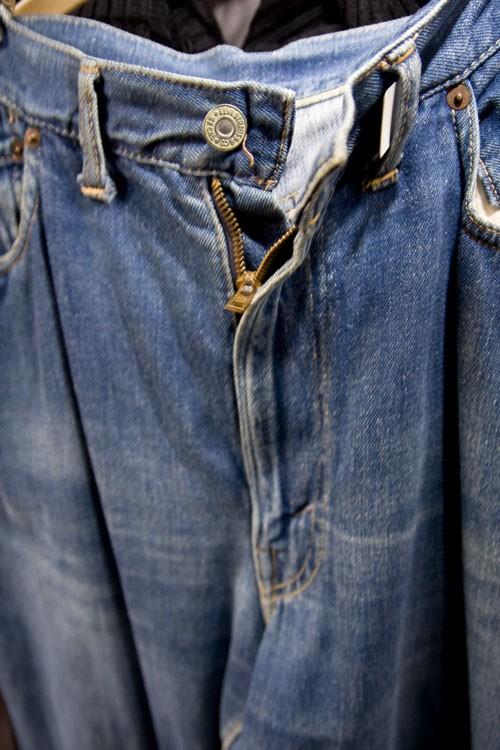A black-and-white image of a flickering neon sign reading “”America.”” A scratchy, bootleggy recording of a man’s voice reading poetry. Strong, muscled young backs. Fields of grain. Smoke. Back flips. Bare feet. Fireworks. Blue jeans.
Is it a nouveau film playing at The Loft? A collage of Dorothea Lange images at the Center for Creative Photography? A new mixed-media piece by Fine Arts graduate students? No, folks, it’s the new Levi Strauss jeans ad.
The stylish ad spots have been showing up since summer 2009 in movie theaters, television and various forms of print media. The campaign’s tag line is “”Go Forth,”” emphasizing the bluegrass roots feel of early American ingenuity and originality.
The ads are visually striking and oddly mesmerizing: try tearing your eyes away from the flashing images of young, strong bodies running through fields, hugging, kissing or dancing around bonfires wearing jeans and little else to the words of Walt Whitman read, in one version, by the poet himself. The America the ads suggest is as we wish it was: “”So impatient, full of action, full of manly pride and friendship,”” reads a man’s voice as young people dress, undress, and make Levi’s look like the uniform of the sexy modern counterculture.
The black-and-white version features a recording that is thought to be Whitman himself reading his poem “”America.”” As barefoot, many-raced young people run and (not exactly) frolic with odd and striking tension, the scratchy audio reads: “”Strong, ample, fair, enduring, capable, rich … perennial with the Earth, with Freedom, Law and Love.”” A beautiful mixed-race couple kisses passionately to the last word as the minor-keyed music fades. A shirtless man runs through crackling fireworks before two people run along a dark beach bearing a banner reading “”Go Forth.””
Directed by SoCal native and NYU grad Cary Fukunaga and filmed mostly in areas of Katrina-ravaged New Orleans, these spots are everything you could hope for in an ad: artistic, smart, brave and varied, they try to make you feel good, but also think — and, of course, buy the product. If all it takes for this determined, sweaty, sexy America to become a reality is to buy a pair of Levi’s, count me in. According to these ads, America is earth, youth, rebellion, literature and campfires — and a collective backside that looks great in a pair of blue jeans.
This is genius marketing, capturing exactly the spirit of the times and the feeling of the people at this moment in history. We relate to the shirtless, the dirty, the dark, the barefoot, the rough-around-the-edges. Our future is poorly lit, our present tense and tight.
“”I am the new American pioneer,”” the Levi’s Web site reads in handwritten script superimposed over a snapshot of Niagara Falls. “”No longer content to wait for better times. … I will work for better times. ‘Cause no one built this country in suits,”” it reads. The styling, the language and the unsmiling-yet-gorgeous models all catch exactly the tenure and the tension of the times.
But don’t be fooled, O Pioneers: as much as we all would love to be a Levi-clad nation of sweaty, equal bodies perennial with freedom, law and love, Levi Strauss and Co. is the Man these advertisements suggest we stick it to. “”Start a rebellion!”” they shout, while they whisper: “”buy our product.”” While the company was started in the U.S. well over a century ago, the company closed its last American plant in 2003.
No matter how their ad plays to the cash-strapped ethos of today, they still sell $300 jeans. While the ad is not shiny and glossy like ad campaigns we’ve loved to hate in the past, it is only because those ad agency geniuses have tapped into the nation’s desire for the humble, matte and scuffed. As advertising commenter Seth Stevenson wrote at Slate.com, “”This 60-second film is, to me, a small artistic gem. Right up until that Levi’s logo at the end.””
Levi’s is working with activists to better meet fair labor practices, has increased its use of organic cotton, encourages energy-friendly line-drying in its care labels and has partnered with Goodwill to encourage people to donate used jeans. As environmental journalist Jen Boynton wrote on triplepundit.com, “”It’s a genius partnership, and I have to say it felt like an authentic and effective effort to develop and market the partnership.”” But is the company doing this because it is an ethical business, or because people feel better about shelling out major cash for jeans they think make the world better?
The ads promote beautiful imagery, creative production, and expose the TV-watching public to more literature and art than they might otherwise encounter in a week. But if Levi Strauss and Co. is really going to convince any young counter-culturists to buy its pants, it is going to have to take off the ad agency suits. Take a note from your unwitting spokesman Uncle Walt: stop trying to manipulate us and maybe become one of us.
We western youths call your bluff, Levi’s. We’ll watch your ads for free on YouTube, and sure, we’ll buy your jeans — at Goodwill. Keep your $300 stone washes and 501 flares — we go forth in jeans with holes and scuffs of our own making.









